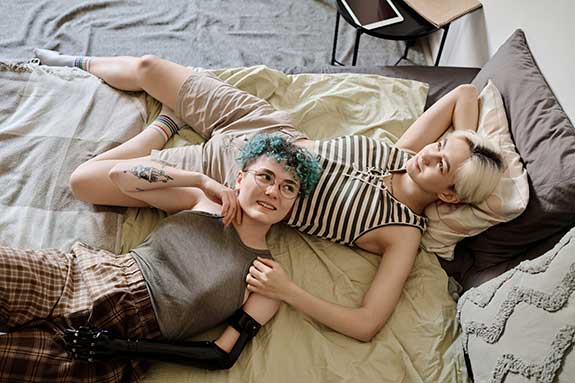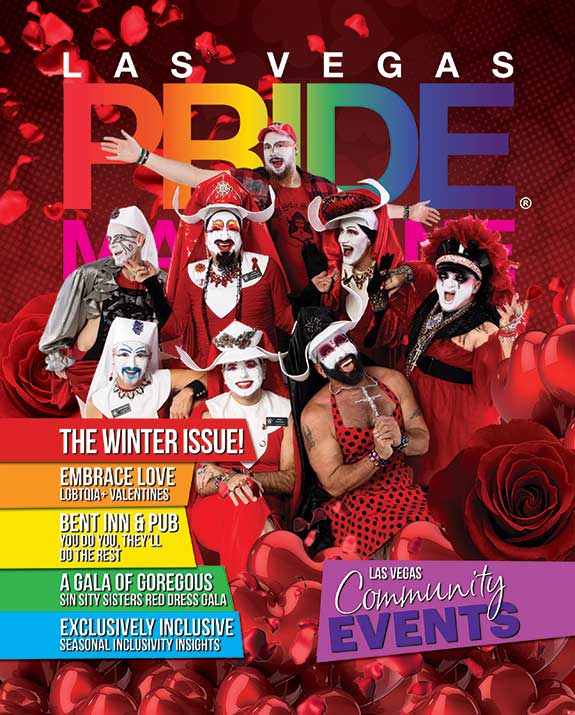Exclusively Inclusive
By Karen Brain
Winter is one of my favorite seasons. When I think of winter, I think of cold weather and warm clothes, the holidays, decorations and celebrations, vacations, shopping and gift giving, cooking and eating, and spending time with loved ones. What’s not to love?
For some, these things I love can also be challenging, cause anxiety, or can be so upsetting that they would like to avoid the season altogether. We never know what someone may be experiencing or has experienced. Or maybe it’s as simple as us just having different interests.

While I do love these wintery things, I can say my physical disability impacts all of them. Some impacts are positive, some create challenges, some cause anxiety, and some have been so upsetting that I wished I could have avoided the season altogether. Remember, I’m not an expert, and I’m only speaking about my own experiences, but to help explain, some examples include (but are not limited to) the following:
Cold Weather and Warm Clothes. I love the colder weather! …Says the person who’s lived in southern California for their entire life. But let me explain. I love the winter weather found in southern California and Las Vegas (preferably non-snowy and non-rainy) because I love to wear my warm clothes, which are not heavy. I need to be able to move around easily. Heavier clothes or layers further limit my mobility, as do tighter fitting clothing, which further limits my independence. Also, I need flat, closed-toed shoes. I want long pants, long sleeves, and comfy loose-fitting clothes. Beyond physical need, I also want to hide most of my body, all the parts that get stares and society has told me verbally and nonverbally is “wrong.” My winter clothes not only make me feel comfortable, they also make me feel safe.
Decorations. While I enjoy the decorations for the various winter holidays, sometimes I find myself in overdecorated spaces to the point that they’re no longer accessible, or a single decoration may block access (doorway, hallway, parking space, etc.). It’s one thing if it’s in a public space or business; it’s another if it’s in someone’s home. I may not feel comfortable saying something about the inaccessibility for fear of offending them. What is my relationship with them? How well do I know them? How comfortable do I feel to address the issue? What impact could it have on our relationship, if any? Will they take it personally? Will they understand? Will my choice of words “make or break” their reaction? I list these questions here because, believe it or not, I have had experiences where people did take it personally, and their ego and position of privilege backed me into a corner.
Celebrations. Speaking of accessibility issues and difficult conversations… What about parties and holiday get-togethers? Similar to the decorations above, locations may be problematic regarding accessibility (rented venues, homes, bars, etc.). Despite the Americans with Disabilities Act (ADA) and Universal Design existing for DECADES, some buildings and businesses remain non-compliant and inaccessible far too often. Plus, to say something is ADA compliant is not to say it is necessarily accessible, as the law is extremely lacking. Without awareness, education, support, enforcement, and accountability, I fear the disabled community may remain left behind when it comes to equity and inclusion. In addition to the considerations I listed in the decorations section above, what type of celebration is it, how important is it to those attending and me, and what are the expectations? For example, is it a New Year’s Eve party with friends or a holiday dinner to meet my partner’s family for the first time? Is it my work holiday party or a guilt-tripped religious service with Grandma?
Vacations. Oh, don’t get me started on this topic! Have you heard about the long-standing concerns the disabled community has with the hospitality and travel industries? For starters, the lack of accessibility and disability-related accommodations, lost and/or broken equipment (like WHEELCHAIRS), transportation challenges, etc. This is not just the existence of these issues but their prevalence, and I’m talking about in THIS country. So, it might not be so exciting to me when presented with a vacation opportunity, depending on the variables and risks involved.
Shopping. Like overdecorating can create inaccessible spaces, the same can be said with overfilling stores with merchandise or displays that may block access. I can’t tell you how often I’ve witnessed a pant leg, sleeve, dress, price tag, or the like get caught in a wheelchair, stroller, shopping cart, or something else because the path was too narrow. The merchandise gets yanked, ends up damaged or on the ground, run over and dirty, or all of the above. This doesn’t necessarily mean limiting your merchandise or displays; it means being creative with your setup and designs. Don’t block paths and accessibility, and improve staff training.
Let’s not forget about the particular time of year when people can lose their patience, manners, and filters in the stores and parking lots, ironically in the name of gift-giving as an expression of love and appreciation towards others during this season of joy and festivities. Once, when walking back to my car, a vehicle suddenly followed me, like a shark hot on my tail. If they had rolled up next to me and asked if I was leaving, I would have said yes and mentioned I was parked in an accessible space so they would know, in case that’s not what they wanted. When I reached my car and they saw it was an accessible space, they yelled out the window at me some derogatory terms and blamed me for wasting their time. Really?! Rude! How dare they follow me that entire way and not offer me a ride to my car! Extra rude! I hope they got coal in their stocking.
I am so incredibly grateful for online shopping and home deliveries! Even though it takes coordination to ensure I can get the items inside my home, I still vote for online shopping over in-store shopping. It’s truly a lifesaver; it’s the best gift ever!
Gift Giving. ‘Tis the season to give gifts, or at least it’s the social expectation, right? I’ve always thought it was so awkward. I mean, where do we draw the line? I appreciate being part of a group with clearly drawn lines, even more so if I agree. It is extremely difficult for me to wrap gifts. I can use gift bags, or maybe I can find someone to help me wrap presents. Then, am I physically able to deliver the gift? But here’s the bigger issue: For those who want to give me a gift, how do they know what fits or is accessible for me? It kills me to receive a gift I know I cannot use. Not just because it’s a tease to give me something I physically cannot wear or utilize, but more importantly because someone spent their money, time, and energy on me, and I can’t use it. I don’t have the heart to tell them. So now what? What do I do with it? This is one of the many reasons I do not like surprises. Most “off-the-shelf” items do not work for me. It will mean more to me if you don’t surprise me; instead, communicate with me. Sometimes, I will not attend social events or holiday get-togethers to avoid the possibility of a gift exchange if I feel I may not be able to decline participation easily.

Cooking. I sure do love the traditional holiday and winter foods. I’ve never had much interest in cooking or baking, though. This makes the fact that my disability has always been a barrier to cooking and baking less disappointing, I guess. Every step in the process is between challenging and impossible for me, except for the “sit and let it bake” time. Lucky for me, I married someone great at both! I get to taste-test. So, I think I got the sweet end of that deal.
Eating. Surprisingly, this Foodie does not like to eat in front of others unless I’m comfortable with the group. It’s not just the part about shoveling food into my face; it’s every detail involved. There are a lot of considerations. For one example, if it’s buffet style, do I have a buffet buddy to help me (because I cannot serve myself), or will staff serve guests? The more casual the environment, the more comfortable I feel asking for help if needed, the more likely I am to attend and eat.
On the other hand, the more formal or professional environments, the less I know the group, or the more I feel there are expectations or the need to impress, the less likely I am to attend or eat. I don’t want big changes made just for me; it seems easier sometimes to not attend or eat. Maybe that’s my internalized ableism speaking? Then there’s the deep-rooted cultural belief like, “How dare you reject my homemade food…you must eat all 14 plates, you disrespectful jerk!” Ironically, just as deeply rooted as the cultural beliefs of some in my community, like “How dare you only provide barstools, high-top tables, and serve gluten-filled finger foods, you ableist jerk!”
Spending Time with Loved Ones. This should feel good and safe and elicit positive memories and excitement for opportunities to build new ones together. If it does for you, count your lucky stars. That is not the case for everyone. Maybe for some, it varies; one holiday season is great, and the next, not so much. When I became an adult, I had a conversation with a person one day who changed my life from that day forward. I hardly knew them, but they noticed I was upset and asked why. Long story short, I explained that spending time with certain parts of the family during the holidays was very stressful for me. I would have physical illness symptoms in anticipation long before the holiday events, during, and afterward. Then they said this: You’re an adult now. You’re allowed to say no. Build your own family. Create your own holiday. So simple, but I swear, it was as if they had just handed me the best holiday gift ever, even better than online shopping! It was the gift of freedom. It was the gift to think for myself and say no. It was the gift to be ME, build my family, and create the environment I wanted for the holidays. I felt free and happy for the first time in a long time and looked forward to the holidays again. The next step was to tell my parents about my new plan. I would spend Christmas Eve with them (and be able to enjoy it now without stress) and spend Christmas Day elsewhere while they joined the usual family events.
The name of the survival game when living with a disability is Think Outside of the Box, as we live in a world that is mostly not made for us. So, to survive (and if we dare, succeed), we must learn creative ways to navigate this world mostly made for able-bodied people. Ironically, it took this beautiful person to teach me to Think Outside of the Box when it came to my little world to find peace and joy again during the holiday season. That was the last time I saw that person, but I’ll never forget them.
Since then, I’ve found ways to enjoy each year’s holiday season despite challenges or stressors. I recently saw a quote from Nightbirde on social media: “You can’t wait until life isn’t hard anymore before you decide to be happy.” That resonated with me. I believe life will always be challenging in some way for each of us. We’ll never be happy if we wait until life is easy.
I hope the things that remind you of winter bring you love and happiness. If they bring challenges or anxieties, I hope they are easily overcome. For anything too upsetting, I wish for you to Think Outside of the Box; may you build your “good and safe family” of loved ones, create your own holiday however you’d like, and know you’re not alone. Happy winter, friends!
This article was originally published in the 2024 Winter Issue of Las Vegas PRIDE Magazine, and can be read in its original format here.


